- Home
- Franklin W. Dixon
Collision Course
Collision Course Read online
Hardy Boys Casefiles - 33
Collision Course
By
Franklin W. Dixon
Chapter 1
"Isn't she beautiful?" Seventeen-year-old Joe Hardy said, slipping his mirrored aviator sunglasses on top of his head.
His older brother, Frank, turned to see which girl had grabbed Joe's attention. But of course he realized in the next second that Joe meant the bright yellow-and-red machine gleaming in the sun before them.
The reflected light from its sleek body glinted in their eyes, and Joe absently pulled his sunglasses down over his blue eyes as he approached the car.
The term car hardly described the automobile the boys were looking at—it was more like a fighter jet on wheels, with wings in the front and back, and air intakes like airplane engines attached to each side of the bullet-shaped body.
"It looks like it could take off and fly, doesn't it?" Joe turned to greet Scott Lavin, the speaker and owner-driver of the race car. Scott was a few inches shorter than Joe and several years older. His racing jumpsuit—and protective gear underneath it—padded out his wiry frame. His hair was light brown, cut short on the top, but long in the back. At twenty-four Scott was young for his profession, but the deep creases around his green eyes made him look older.
"It sure does." Joe grinned. They both knew the car was designed to do just the opposite it would hug the ground at high speeds and in tight turns.
"It seems so small for a race car," Joe added. "Look, the top of the roll bar doesn't even reach my waist."
"Well, it has to be built low to the ground," Scott noted, "and it is a tight fit in the cockpit. The whole thing's pretty compact. But the engine can crank over six hundred horsepower, and I've gotten her over two hundred miles per hour on the straightaways."
His teeth flashed in a wide grin. "Formula One Grand Prix race cars aren't very much like those stock cars that chase each other around in a circle."
"This baby's a whole different breed." Joe ran a hand along the side of the speed machine. He thought it was just about the most beautiful thing he'd ever seen.
it's been a long time coming," Scott reminded him. Three years earlier, when Joe was only fourteen, Scott had been organizing and tracing in amateur road rallies in Bayport. Now he had returned to his hometown with his own Formula One racing team.
» "We had some good times with that old Porsche, didn't we, Joe?" Scott went on. "You may have been too young to drive it, but you sure Weren't too young to take the engine apart and put it back together again."
"Not many people would have given me the chance at that age." Joe smiled at the memory. "But you accepted me without a second thought. My favorite part was when we'd road test it on the rally course that you mapped out."
"Ah, yes!" Scott chuckled. "The old Bayport Road Rally. I remember it well."
The business people of Bayport remembered the road rallies, too. Scott's careful planning and attention to detail had created a popular local event that had brought money into the city. The city council, always looking for ways to bring in more money, decided to expand on Scott Lavin's Idea. This year they had hired a slick racing promoter named Russell Arno to organize a Formula One Grand Prix race in Bayport.
"Well, I'm not too young to drive now," Joe said, bringing his mind back to the present. "And I sure would like a chance to give this baby a spin."
"It takes more than a driver's license to handle one of these." Scott looked with pride at the car he had built himself. "But maybe you'll get your chance."
While Joe talked cars with Scott, Frank scanned the crowd, shielding his brown eyes against the sun. "There sure are a lot of people here — mostly out-of-town reporters," he said.
"Maybe we should hire a promoter like this Arno character," Joe said, flashing his brother a smile.
Frank laughed. "Yeah, our last case, Blood Money, should have been good for a series of comic books. All those mobsters falling over one another, trying to grab that inheritance—and Dad caught in the middle!"
Their father, Fenton Hardy, was a private investigator and former police detective. His name wound up on a hit list when a dying gangster left a fortune to his enemies. Frank and Joe had been forced to risk their own lives to protect their father from greedy mobsters.
"You'd probably feel more at home investigating Russell Arno than making a deal with him," Scott said. "He's got some kind of deal going now with Angus McCoy. I don't like the guy, but he sure knows how to pull in the racing fans."
"Angus is the former world champion Grand Prix driver," Joe added for Frank's benefit.
"McCoy is a crowd pleaser. That's why all the reporters are here. The race is still three days away, but they all turned up for McCoy's official qualifying lap around the course." - Scott shrugged. "The time trials are important because the driver with the best time gets the best starting position. But the rest of us aren't 'not worthy' — not when the press can cover Angus McCoy's thrilling race against the clock."
"He was the best in his day," Joe said, catching the bitterness in Scott's words. "But he's past his prime now."
"He still may be the best in this crowd." Scott stared at the assorted drivers, reporters, photographers, and race officials who were gathered for McCoy's time trial. "Everybody thinks he'll have the best lap time."
Joe saw McCoy standing next to Arno, both men surrounded by reporters. Like Scott, the lines around the champion's eyes made it hard to judge his age, and his wavy red hair and fair skin made him look like a big kid. But Joe could tell by McCoy's piercing gray eyes that he was no innocent kid.
As if sensing Joe's gaze, McCoy turned his eyes toward Joe and stared. Joe could almost feel the driver's confidence. He pulled his eyes away and put a hand on Scott's shoulder. "He'll have to be pretty fast if he wants to beat your time, Scott. Your average speed was almost one seventy!"
"Ya," came a fourth voice, with a slight German accent. "He even beat me. But I expect to do better tomorrow."
Scott turned to greet the newcomer. "Reinhart! Good to see you. Joe and Frank Hardy, meet Reinhart Voss. Reinhart is the number-two driver for the McCoy racing team."
"How many cars does McCoy have?" Frank asked.
"We used to have three," Voss said. "But times have been hard, and now we have only two. Let's hope nothing happens to McCoy's car today—or else he will end up driving mine and I will have nothing."
"That's what happens when you're number two," Scott said, laughing. "I don't have that problem. Of course, I also don't have a second car either. So if something happens to my car, I'll be sitting in the grandstand with you!"
Joe looked back in the direction of McCoy and Arno. McCoy had worn his fireproof racing suit to the press conference and was now pulling on his crash helmet as he walked to his car. Completely covered in protective gear, anybody or anything could have been inside that outfit, Joe observed. Even with the helmet visor up, the driver's identity was a mystery. In fact, Joe thought that the fire retardant face mask—resembling a ski mask with two large oval holes for the eyes—made the guy look like an alien from an old sci-fi movie.
"Can we meet McCoy?" Joe suddenly asked Voss.
"Ya, sure. Come. I will take you to him."
But as the group of four moved toward the center of the crowd they were intercepted by Russell Arno. "Well, if it isn't Reinhart Voss and Scott Lavin, two of my favorite drivers. Having a good time?"
"We were just going to introduce my friends, frank and Joe Hardy, to Angus," Scott replied.
"The Hardy brothers? You boys have made quite a name for yourselves in Bayport."
Frank looked at Arno curiously. The promoter looked as if he were a middle-aged banker. His hair was thinning on top, and he was a little over
weight—but his tailored suit was cut beautifully and made him look thinner.
"Where did you hear that?" Frank asked.
"When Scott asked me to put your names on the guest list for the press party, I made a few inquiries," Arno explained. "I make it a point to know something about all my guests. And I would be delighted to introduce you to Mr. McCoy, but as you can see, he's getting in his car now. Perhaps some other time?"
"That's okay," Joe said. "We'll just hang around until he finishes."
Arno flashed a toothy smile. "Say, I've got an idea! We're videotaping his entire lap from my helicopter. Why don't you come along? You can see the whole race course from the air and witness the historic event from the best seats in the house!"
Joe didn't care much for Arno's tone or manner. The slick way he had breezed into town and taken all the credit for Scott's work didn't sit well with Joe. Still, this was too good an opportunity to pass up. "Sounds great," came Joe's reply.
"How about you, Scott? Arno asked, smiling at the young driver.
"No thanks," Scott said, looking Arno straight in the eyes. "I've seen McCoy drive before, and I'm quite familiar with the layout of the course. You and your pals on the city council didn't bother to give me any credit, but those are my course maps you used as the blueprint for the Bayport Grand Prix."
"And I have no great love of flying," Voss said, breaking the awkward silence that followed Scott's quiet outburst. "I like to go fast—but I prefer to do it on the ground."
Joe felt a twinge of guilt as he and Frank moved away from Scott, toward a cargo helicopter that had been modified to hold a video crew and cameras. He almost felt as if he were deserting his friend. Arno hustled them on board and introduced them to a short man with a notepad. "I'd like you to meet T. B. Martin. He's writing McCoy's biography."
The writer wore thick, wire-rim glasses and a photographer's vest crammed with notebooks, pens, and even a small tape recorder. His dark hair and beard were trimmed so short that they bristled. "Actually, I'm just a ghost writer," Martin said. "McCoy will get the credit."
"Oh, so it's supposed to be an autobiography," Frank shouted as the large turbine engine started '- to wind up.
"Sure, it's an autobiography," Joe cut in, laughing as the lumbering machine lifted off the ground. "McCoy drives cars for a living, doesn't he?"
As the helicopter rose higher, Frank could see the whole city of Bayport spread out below, as well as Barmet Bay and the Atlantic Ocean beyond that.
Joe outlined the course for his brother. "It's kind of a sloppy U-shape, with a few squiggles thrown in. It starts at the Bayport Fairgrounds and then runs south through the middle of town and curves around the bay to the ocean.
"Down there," he shouted, pointing again, "it swings back behind the city to the west. Then it nins into the highway and heads up a long straight section due north. Up there, it turns east and runs to the cliffs on the coast north of town. Finally, it swings back along the bay again."
"This course reminds me of Monte Carlo," Martin shouted above the din of the engine and the rotor blades.
Joe focused out the window again and saw McCoy's race car, a tiny ant-mobile, crawling around the turn at the south end of the course. Now it was heading back inland. Because of the helicopter's height and speed, McCoy seemed to be barely moving, but Joe knew he must be topping 190 as he headed into the long straightaway that ran to the north before the course turned uphill to the northern cliffs at the ocean's edge.
"Yeah," Joe yelled back to Martin. "The only difference is the tunnel at Monte Carlo doesn't lead out into a blind hairpin turn!" He was talking about the tunnel cut through the cliff that ended just before the road made a tight westward turn away from the ocean to follow the curve of Bar-met Bay. Everyone in Bayport knew about the hazardous curve. It had been the scene of many accidents over the years — some of them fatal. "If you miss that turn, it's a long, rough ride down to the bottom."
The helicopter swung out over the ocean as McCoy disappeared into the tunnel. It seemed like an eternity before he came out the other end, although it couldn't have been more than a few seconds. The car came rocketing out of the tunnel, hugging the road surface in an impressive display of aerodynamic technology. But something was wrong.
"He's going too fast! He won't make it!" Frank shouted. Before anyone could respond, the car smashed through the guardrail on the hairpin turn.
For a second it looked as if the car could fly. But its forward momentum quickly gave way to the pull of gravity, and the car plummeted toward the cold, waiting waters of the Atlantic two hundred feet below.
The impact with the water barely seemed to slow it down. The car knifed cleanly through the surface—and sank without a trace.
Chapter 2
The helicopter quickly swooped down to the spot where the race car had plunged into the ocean. Concentric waves rippled across the water, but there was no sign of McCoy or the car. The bullet-shaped vehicle had sliced straight to the bottom.
Frank Hardy looked over to see his brother fumbling at the laces on his shoes. "What are you doing?"
"I'm going in after him!" Joe unbuttoned his shirt as he lunged out of his seat. "He might still be alive, trapped down there!"
Frank leapt up and stepped in front of the sliding cargo door before Joe could reach it. He grabbed his brother by the shoulders. "Stop for a second and think, Joe. The water is at least fifty feet deep here, and you know what the currents are like."
Joe struggled against his brother's arms. "We can't just leave him down there!"
Frank pushed Joe away from the door. "The impact from the two-hundred-foot fall probably killed him before the car sank. If you jump in without scuba gear, you'll just become another casualty."
"He's right," T. B. Martin agreed grimly. "People like McCoy court death for a living. He knew the risks. Living on the edge was what he was all about. For McCoy, it was fun. But he wouldn't want someone else to risk his own life needlessly."
Frank put his hand on his brother's shoulder. "Come on, Joe. Sit down. You're not going anywhere."
Joe's shoulders slumped. He knew they were right—but he couldn't help thinking they had to do something.
Frank was one step ahead of him. "Tell the pilot to radio the police and put the chopper down on the road where the car went through the guardrail," Frank said to Arno.
Russell Arno was just staring out at the ocean. He seemed distracted—or maybe it was just the shock of the accident. After a moment Arno nodded and shouted into the pilot's ear.
Frank and Joe were the first ones to jump out of the copter when it touched down. They headed straight for the twisted remains of the guardrail. It looked like a licorice stick that had been casually ripped in half—except this licorice stick was made of steel, Joe reminded himself.
The guardrail wasn't the only thing damaged by the crash. Debris lay all over the place. The thin "wings" attached to the needle-nose front of the race car had been ripped off and were now lying crumpled on either side of the gash in the barrier.
Frank stooped down to examine some of the parts that didn't make the final voyage and were now scattered on the road. There were some shards of glass, a side-view mirror — and something else that caught Frank's eye. He picked it up to inspect it more closely. It appeared to be some kind of electronic device.
"This doesn't look like a normal car part," he mused, thinking out loud.
A voice from behind Frank broke his train of thought. "Nothing on these Formula One machines is 'normal.' " Frank turned to see Arno peering over his shoulder. "This is the cutting edge of automotive high tech," Arno continued. "Half the stuff under the hood is top secret—so the driver can keep his edge. McCoy did a lot of his own mechanical work. There's a good chance that the only person who can tell you what you're holding is down there." Arno motioned down to the deceptively calm waters.
Joe looked over at Arno, noting how composed the promoter seemed, given the circumstances. "You don't seem to
o concerned about McCoy's death," he said, trying to control his temper.
Arno shrugged. "It's like Martin told you— McCoy lived on the edge. All good racing drivers do. The danger is part of the thrill. Some of these guys, like McCoy, think they're so good they can cheat death. And when you start thinking like that, death sneaks up behind you.
"But you're wrong to think I'm not concerned," Arno added, sadness creeping into his voice for the first time. "McCoy and I worked together a long time. He was a hard man to like, but I'll miss him."
Their conversation was interrupted by the arrival of a squad car carrying two of Bayport's finest. The driver got out and lumbered over to the small group, while the other officer walked toward T. B. Martin to take his statement. The uniformed man who approached Frank and Joe was large, more than a little out of shape, and sported a sizable paunch. Joe wondered how he managed to keep his pants up, before he noticed his name-plate "Reed."
"Okay," Officer Reed huffed. "What happened here?"
Before either Frank or Joe could say anything, Arno started in. "A tragic accident," he began smoothly. "Mr. McCoy miscalculated the turn, and at one hundred fifty miles per hour it was a deadly mistake."
"Stupid race car drivers," Reed grumbled. "There's a reason for the posted speed limit, you know."
"At the posted speed limit," — Arno jerked his thumb back toward the sign that said 15 MPH — "the engine would have stalled out, and he would have had to push the car around the turn. That1 would not have produced a spectacular lap time."
The police officer looked back toward the tunnel, and then his eyes moved from the tunnel back to the gaping hole in the guardrail. "Well, what kind of lap time do you suppose he'll get now?" He frowned. "The only thing 'spectacular' here was his crash. Maybe they'll cancel that stupid race now."
"I doubt it," Arno said curtly as he walked away.
"What do you think of this?" Frank said, holding out the electronic device he had found.
"What am I supposed to think?" the police officer retorted gruffly. "Some stupid gizmo to make a car go too fast and ruin a perfectly good guardrail. This is going to cost the county plenty, you know."

 The Great Pumpkin Smash
The Great Pumpkin Smash Who Let the Frogs Out?
Who Let the Frogs Out?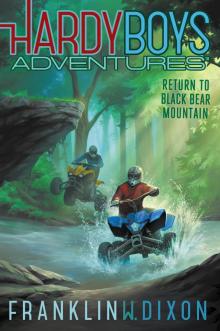 Return to Black Bear Mountain
Return to Black Bear Mountain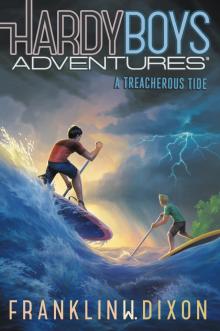 A Treacherous Tide
A Treacherous Tide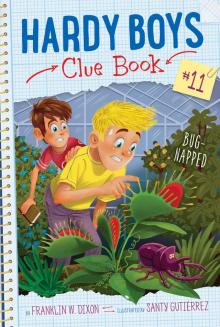 Bug-Napped
Bug-Napped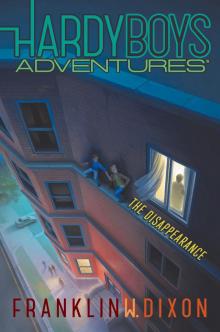 The Disappearance
The Disappearance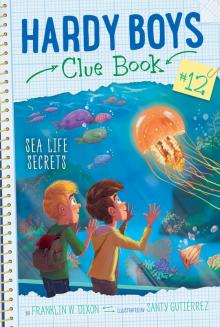 Sea Life Secrets
Sea Life Secrets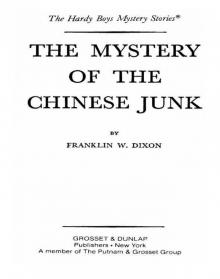 The Mystery of the Chinese Junk
The Mystery of the Chinese Junk A Skateboard Cat-astrophe
A Skateboard Cat-astrophe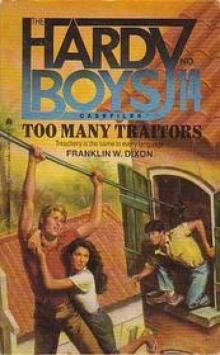 Too Many Traitors
Too Many Traitors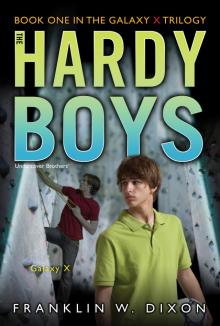 Galaxy X
Galaxy X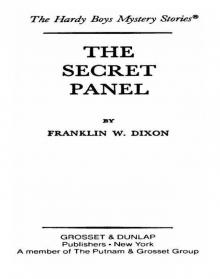 The Secret Panel
The Secret Panel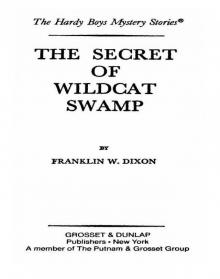 The Secret of Wildcat Swamp
The Secret of Wildcat Swamp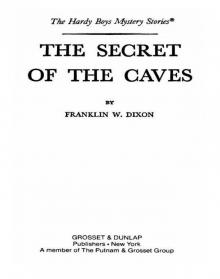 The Secret of the Caves
The Secret of the Caves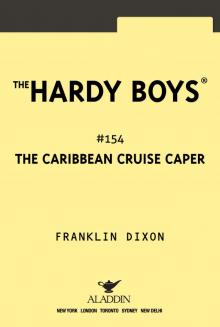 The Caribbean Cruise Caper
The Caribbean Cruise Caper Without a Trace
Without a Trace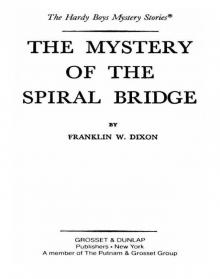 The Mystery of the Spiral Bridge
The Mystery of the Spiral Bridge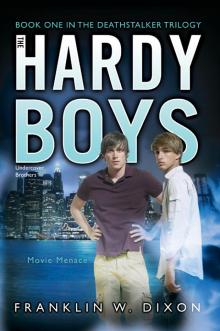 Movie Menace
Movie Menace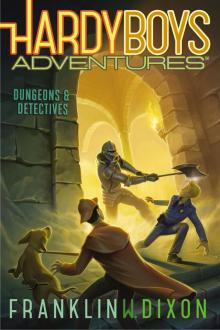 Dungeons & Detectives
Dungeons & Detectives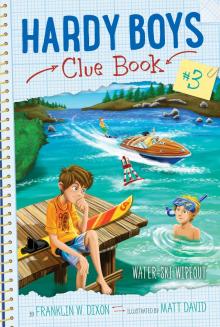 Water-Ski Wipeout
Water-Ski Wipeout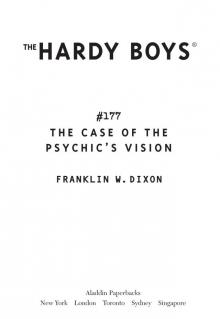 The Case of the Psychic's Vision
The Case of the Psychic's Vision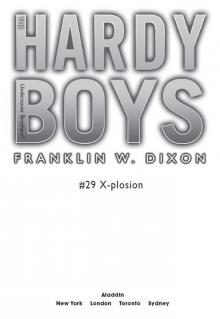 X-plosion
X-plosion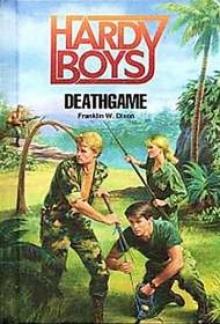 Deathgame
Deathgame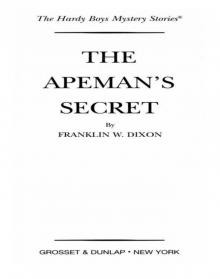 The Apeman's Secret
The Apeman's Secret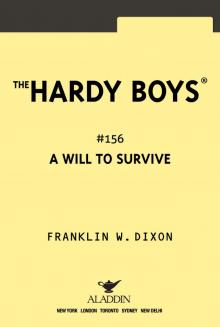 A Will to Survive
A Will to Survive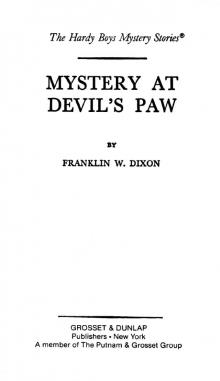 Mystery at Devil's Paw
Mystery at Devil's Paw Blood Money
Blood Money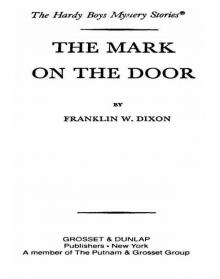 The Mark on the Door
The Mark on the Door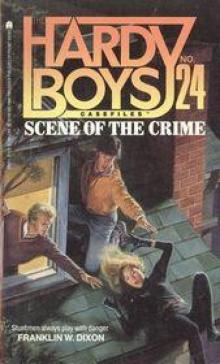 Scene of the Crime
Scene of the Crime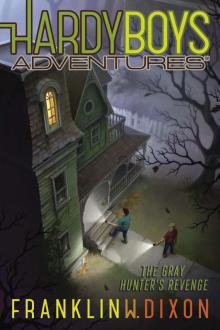 The Gray Hunter's Revenge
The Gray Hunter's Revenge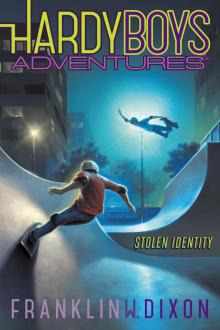 Stolen Identity
Stolen Identity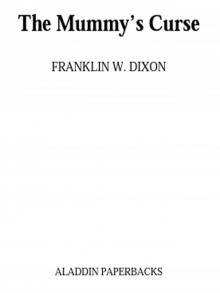 The Mummy's Curse
The Mummy's Curse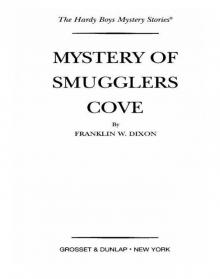 Mystery of Smugglers Cove
Mystery of Smugglers Cove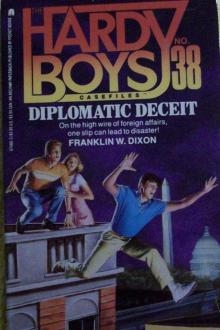 Diplomatic Deceit
Diplomatic Deceit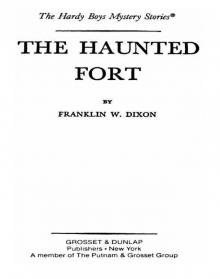 The Haunted Fort
The Haunted Fort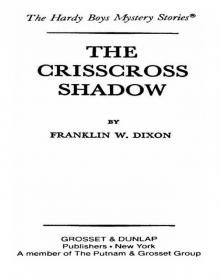 The Crisscross Shadow
The Crisscross Shadow Secret of the Red Arrow
Secret of the Red Arrow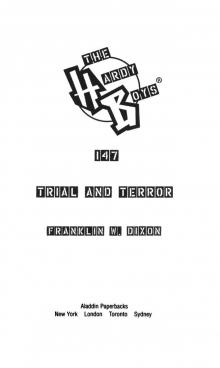 Trial and Terror
Trial and Terror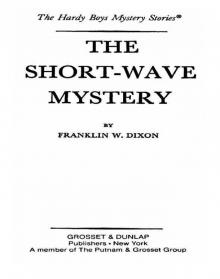 The Short-Wave Mystery
The Short-Wave Mystery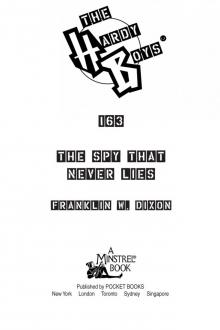 The Spy That Never Lies
The Spy That Never Lies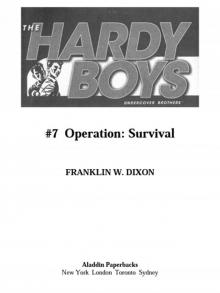 Operation: Survival
Operation: Survival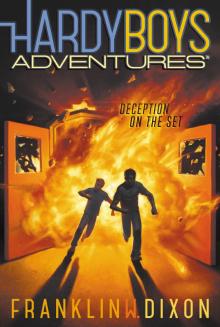 Deception on the Set
Deception on the Set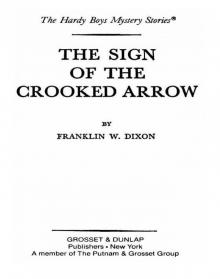 The Sign of the Crooked Arrow
The Sign of the Crooked Arrow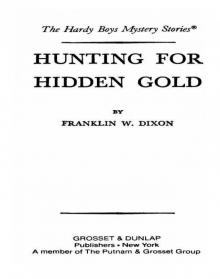 Hunting for Hidden Gold
Hunting for Hidden Gold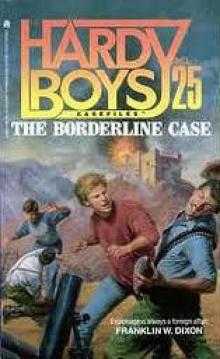 Disaster for Hire
Disaster for Hire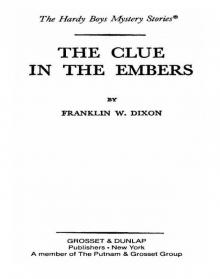 The Clue in the Embers
The Clue in the Embers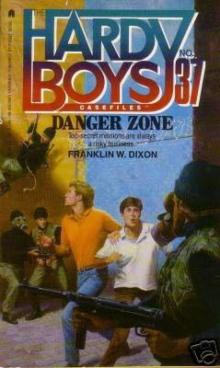 Danger Zone
Danger Zone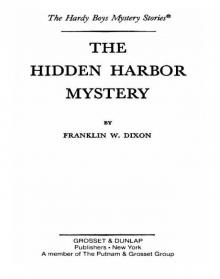 The Hidden Harbor Mystery
The Hidden Harbor Mystery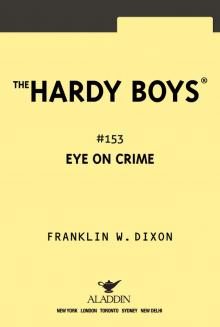 Eye on Crime
Eye on Crime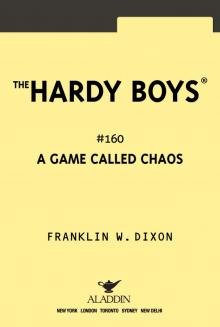 A Game Called Chaos
A Game Called Chaos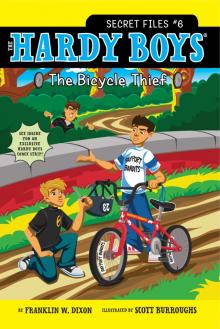 The Bicycle Thief
The Bicycle Thief The Missing Playbook
The Missing Playbook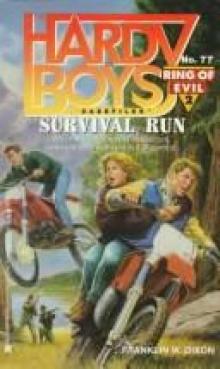 Survival Run
Survival Run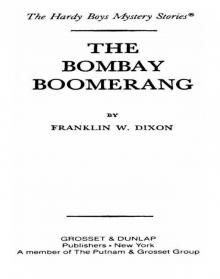 The Bombay Boomerang
The Bombay Boomerang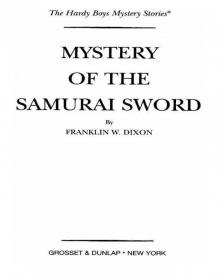 Mystery of the Samurai Sword
Mystery of the Samurai Sword Burned
Burned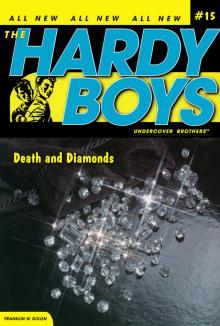 Death and Diamonds
Death and Diamonds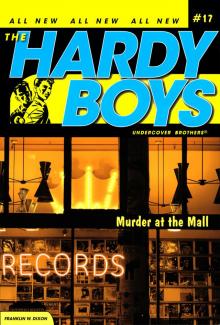 Murder at the Mall
Murder at the Mall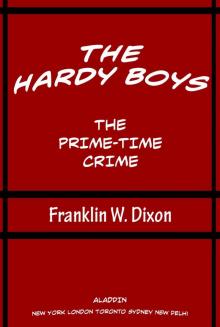 The Prime-Time Crime
The Prime-Time Crime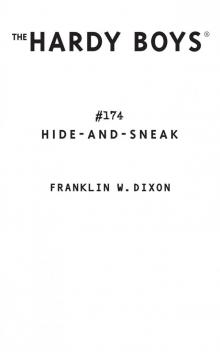 Hide-and-Sneak
Hide-and-Sneak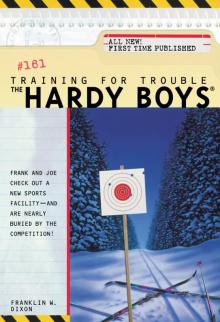 Training for Trouble
Training for Trouble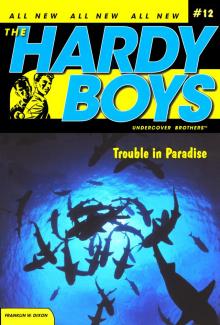 Trouble in Paradise
Trouble in Paradise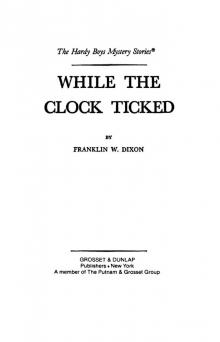 While the Clock Ticked
While the Clock Ticked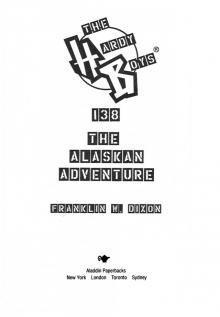 The Alaskan Adventure
The Alaskan Adventure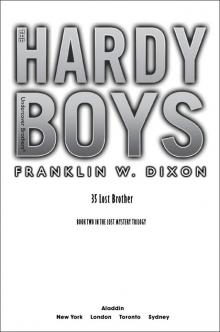 The Lost Brother
The Lost Brother Tunnel of Secrets
Tunnel of Secrets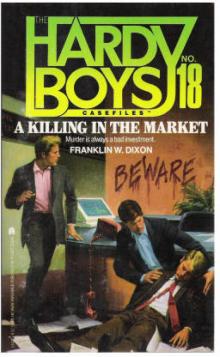 A Killing in the Market
A Killing in the Market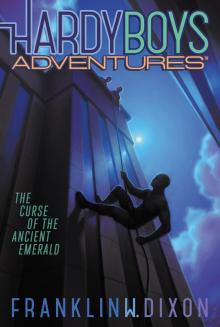 The Curse of the Ancient Emerald
The Curse of the Ancient Emerald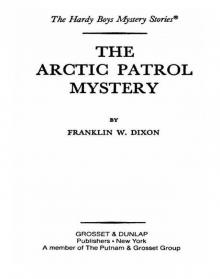 The Arctic Patrol Mystery
The Arctic Patrol Mystery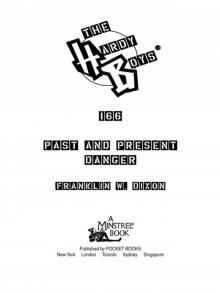 Past and Present Danger
Past and Present Danger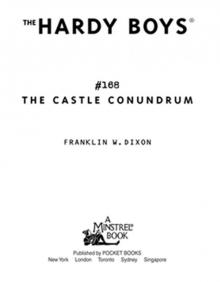 The Castle Conundrum (Hardy Boys)
The Castle Conundrum (Hardy Boys)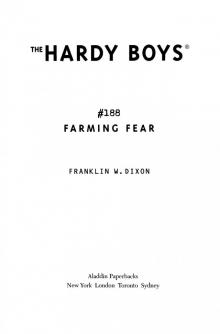 Farming Fear
Farming Fear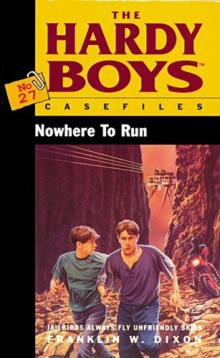 Nowhere to Run
Nowhere to Run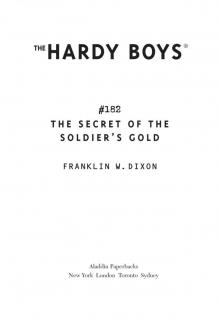 The Secret of the Soldier's Gold
The Secret of the Soldier's Gold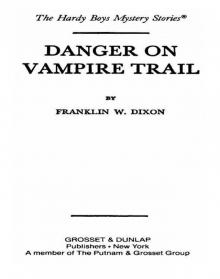 Danger on Vampire Trail
Danger on Vampire Trail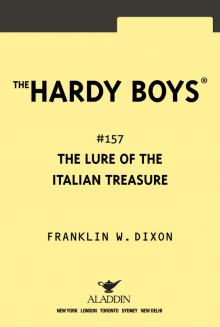 The Lure of the Italian Treasure
The Lure of the Italian Treasure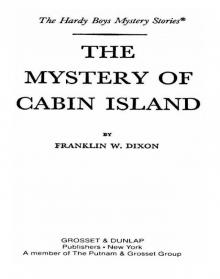 The Mystery of Cabin Island
The Mystery of Cabin Island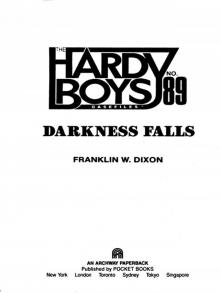 Darkness Falls
Darkness Falls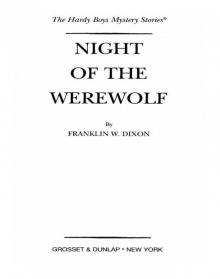 Night of the Werewolf
Night of the Werewolf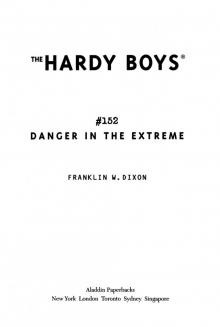 Danger in the Extreme
Danger in the Extreme The Lazarus Plot
The Lazarus Plot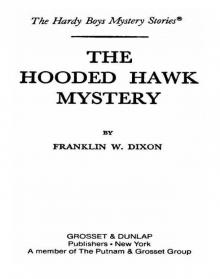 The Hooded Hawk Mystery
The Hooded Hawk Mystery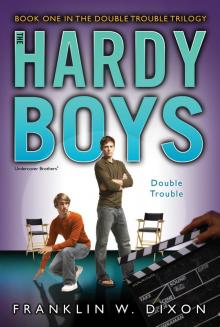 Double Trouble
Double Trouble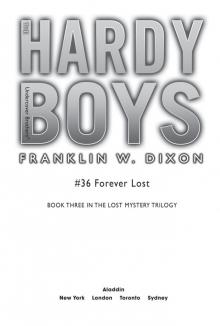 Forever Lost
Forever Lost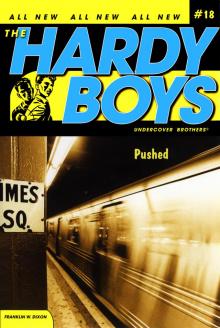 Pushed
Pushed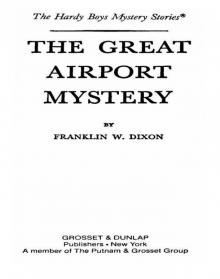 The Great Airport Mystery
The Great Airport Mystery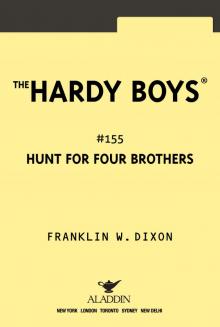 The Hunt for Four Brothers
The Hunt for Four Brothers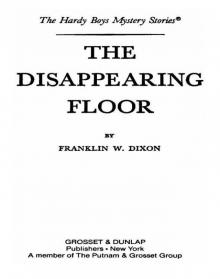 The Disappearing Floor
The Disappearing Floor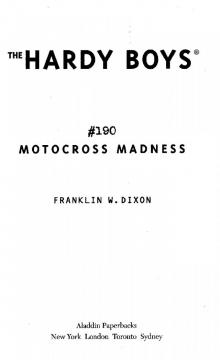 Motocross Madness
Motocross Madness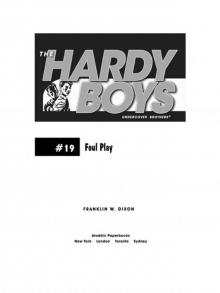 Foul Play
Foul Play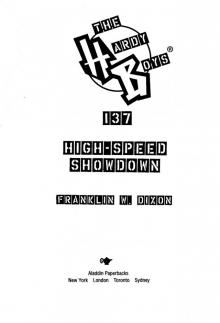 High-Speed Showdown
High-Speed Showdown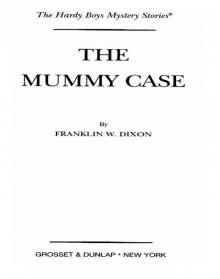 The Mummy Case
The Mummy Case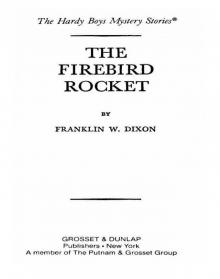 The Firebird Rocket
The Firebird Rocket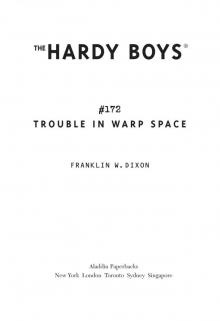 Trouble in Warp Space
Trouble in Warp Space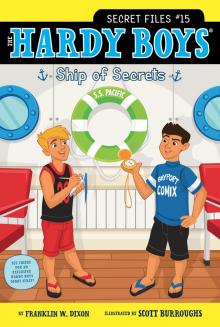 Ship of Secrets
Ship of Secrets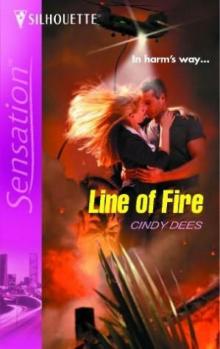 Line of Fire
Line of Fire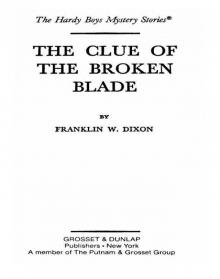 The Clue of the Broken Blade
The Clue of the Broken Blade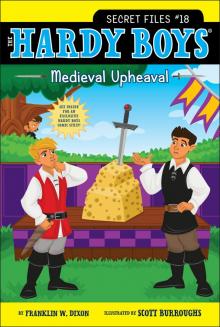 Medieval Upheaval
Medieval Upheaval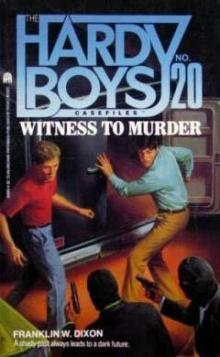 Witness to Murder
Witness to Murder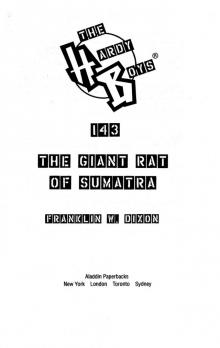 The Giant Rat of Sumatra
The Giant Rat of Sumatra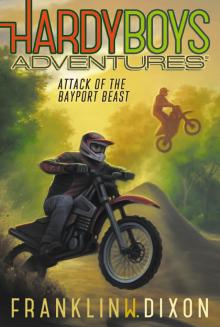 Attack of the Bayport Beast
Attack of the Bayport Beast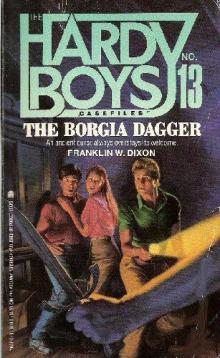 The Borgia Dagger
The Borgia Dagger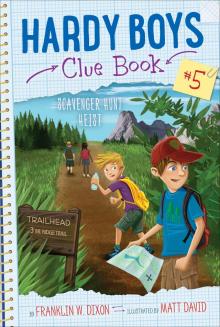 Scavenger Hunt Heist
Scavenger Hunt Heist No Way Out
No Way Out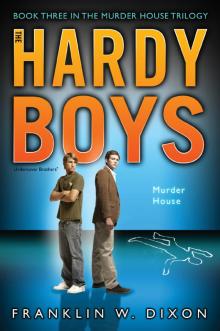 Murder House
Murder House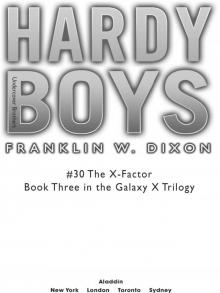 The X-Factor
The X-Factor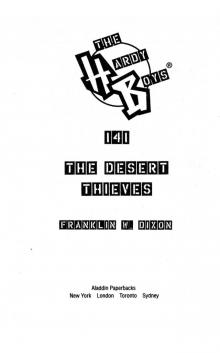 The Desert Thieves
The Desert Thieves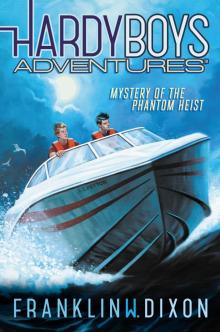 Mystery of the Phantom Heist
Mystery of the Phantom Heist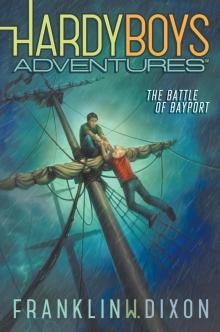 The Battle of Bayport
The Battle of Bayport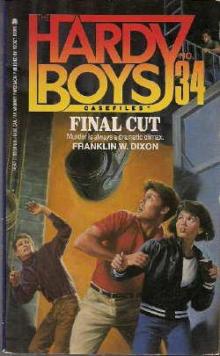 Final Cut
Final Cut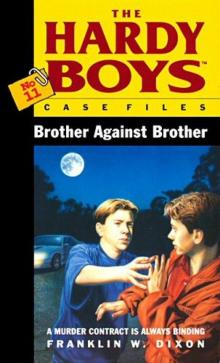 Brother Against Brother
Brother Against Brother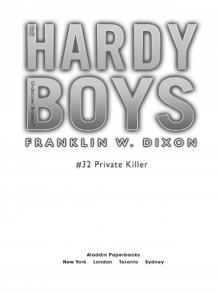 Private Killer
Private Killer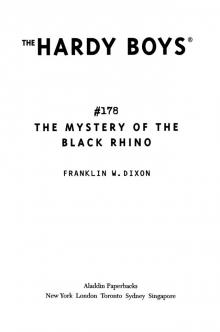 The Mystery of the Black Rhino
The Mystery of the Black Rhino Feeding Frenzy
Feeding Frenzy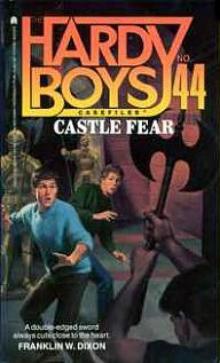 Castle Fear
Castle Fear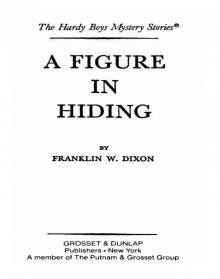 A Figure in Hiding
A Figure in Hiding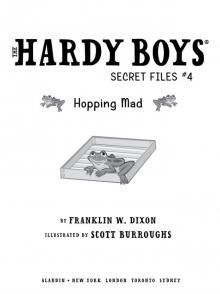 Hopping Mad
Hopping Mad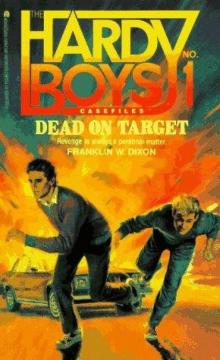 Dead on Target
Dead on Target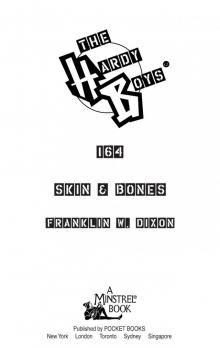 Skin and Bones
Skin and Bones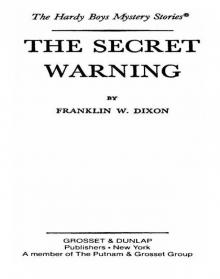 The Secret Warning
The Secret Warning Flesh and Blood
Flesh and Blood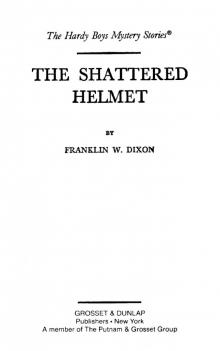 The Shattered Helmet
The Shattered Helmet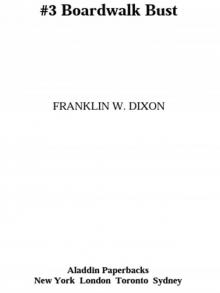 Boardwalk Bust
Boardwalk Bust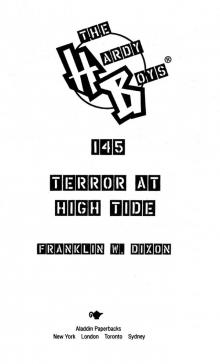 Terror at High Tide
Terror at High Tide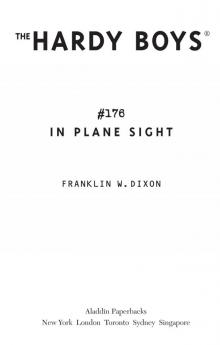 In Plane Sight
In Plane Sight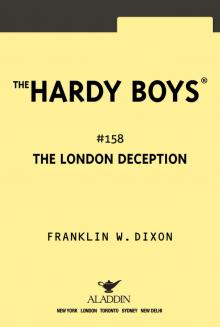 The London Deception
The London Deception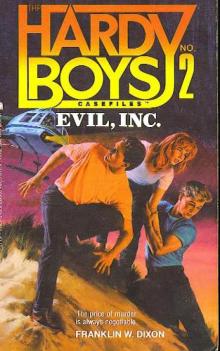 Evil, Inc.
Evil, Inc.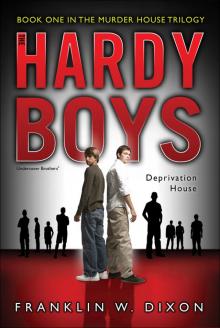 Deprivation House
Deprivation House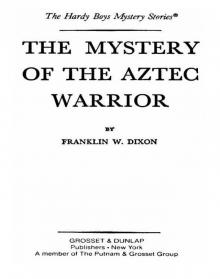 The Mystery of the Aztec Warrior
The Mystery of the Aztec Warrior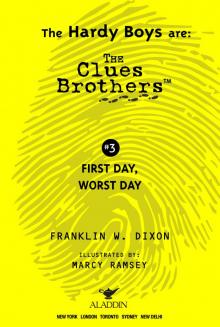 First Day, Worst Day
First Day, Worst Day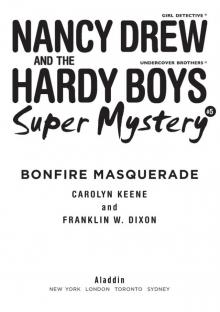 Bonfire Masquerade
Bonfire Masquerade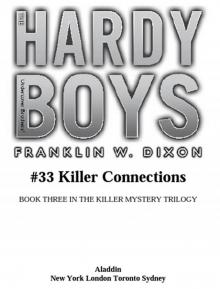 Killer Connections
Killer Connections Strategic Moves
Strategic Moves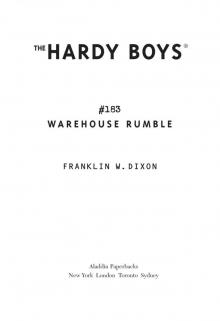 Warehouse Rumble
Warehouse Rumble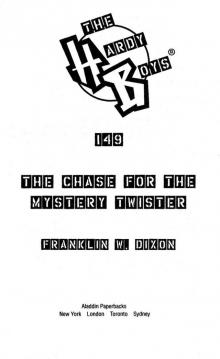 The Chase for the Mystery Twister
The Chase for the Mystery Twister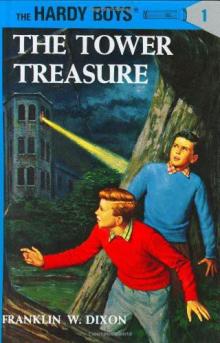 The Tower Treasure thb-1
The Tower Treasure thb-1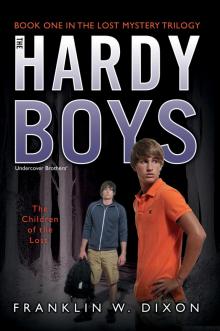 The Children of the Lost
The Children of the Lost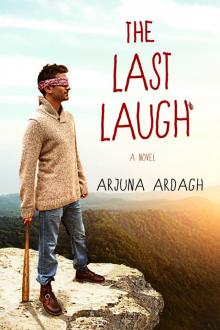 The Last Laugh
The Last Laugh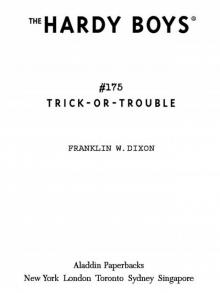 Trick-or-Trouble
Trick-or-Trouble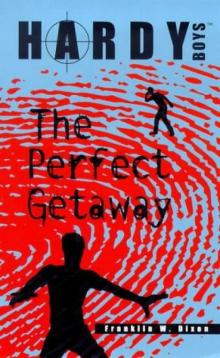 Perfect Getaway
Perfect Getaway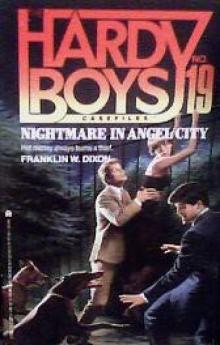 Nightmare in Angel City
Nightmare in Angel City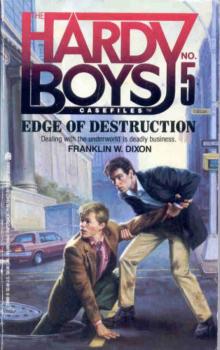 Edge of Destruction
Edge of Destruction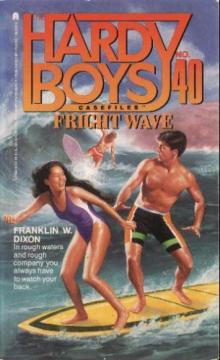 Fright Wave
Fright Wave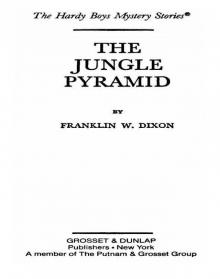 The Jungle Pyramid
The Jungle Pyramid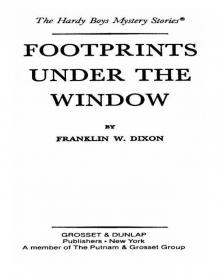 Footprints Under the Window
Footprints Under the Window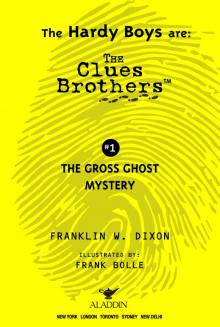 The Gross Ghost Mystery
The Gross Ghost Mystery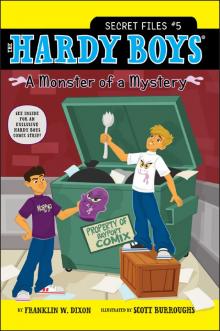 A Monster of a Mystery
A Monster of a Mystery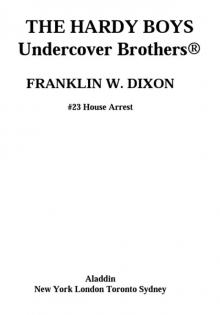 House Arrest
House Arrest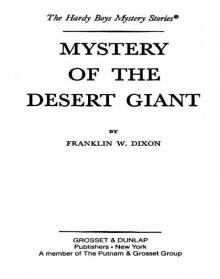 Mystery of the Desert Giant
Mystery of the Desert Giant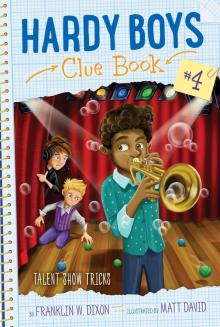 Talent Show Tricks
Talent Show Tricks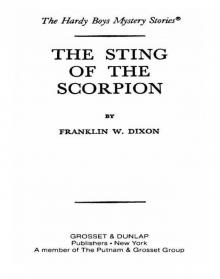 The Sting of the Scorpion
The Sting of the Scorpion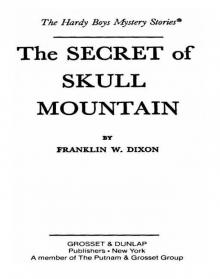 The Secret of Skull Mountain
The Secret of Skull Mountain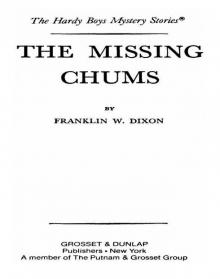 The Missing Chums
The Missing Chums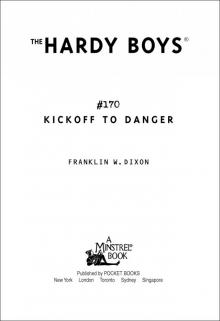 Kickoff to Danger
Kickoff to Danger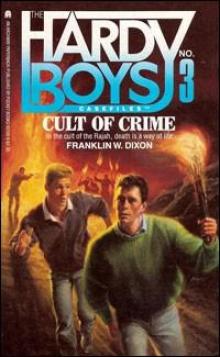 Cult of Crime
Cult of Crime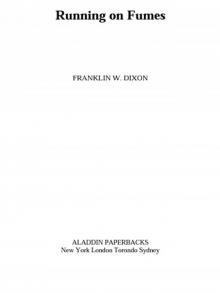 Running on Fumes
Running on Fumes Martial Law
Martial Law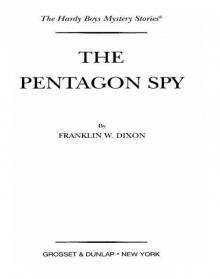 The Pentagon Spy
The Pentagon Spy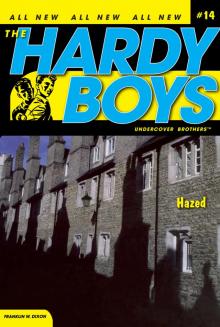 Hazed
Hazed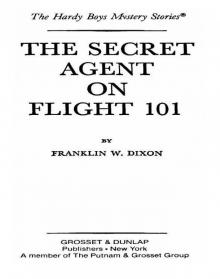 The Secret Agent on Flight 101
The Secret Agent on Flight 101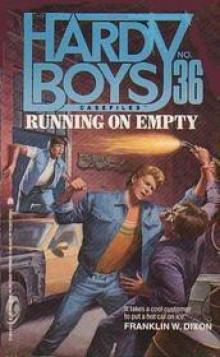 Running on Empty
Running on Empty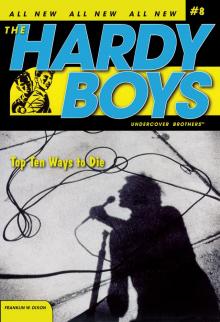 Top Ten Ways to Die
Top Ten Ways to Die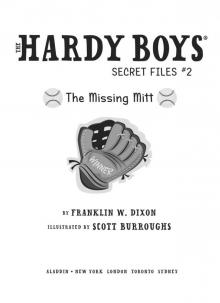 The Missing Mitt
The Missing Mitt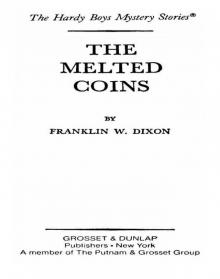 The Melted Coins
The Melted Coins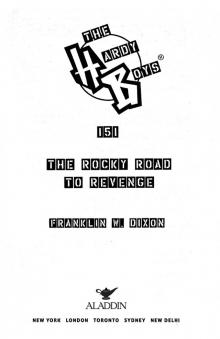 The Rocky Road to Revenge
The Rocky Road to Revenge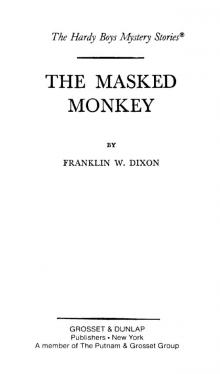 The Masked Monkey
The Masked Monkey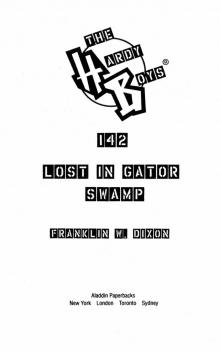 Lost in Gator Swamp
Lost in Gator Swamp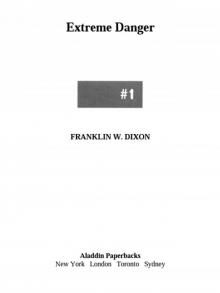 Extreme Danger
Extreme Danger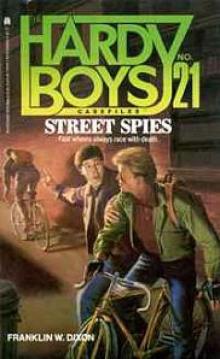 Street Spies
Street Spies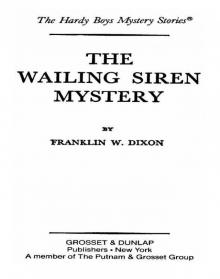 The Wailing Siren Mystery
The Wailing Siren Mystery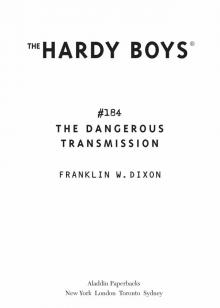 The Dangerous Transmission
The Dangerous Transmission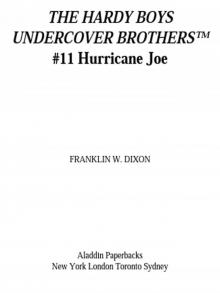 Hurricane Joe
Hurricane Joe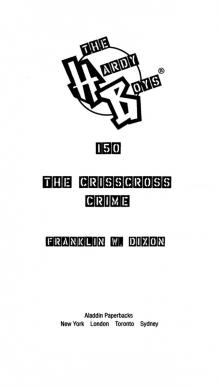 The Crisscross Crime
The Crisscross Crime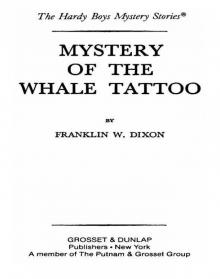 Mystery of the Whale Tattoo
Mystery of the Whale Tattoo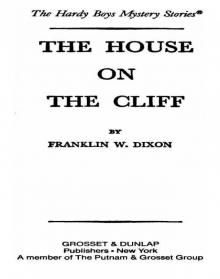 The House on the Cliff
The House on the Cliff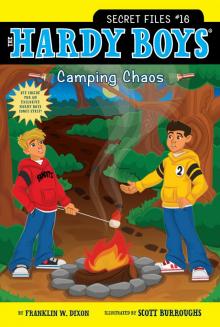 Camping Chaos
Camping Chaos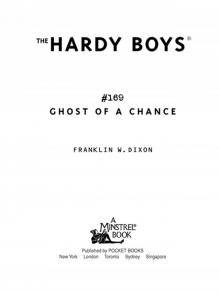 Ghost of a Chance
Ghost of a Chance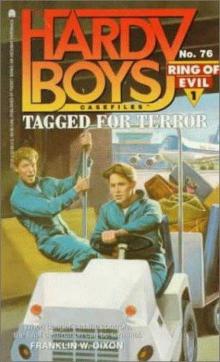 Tagged for Terror
Tagged for Terror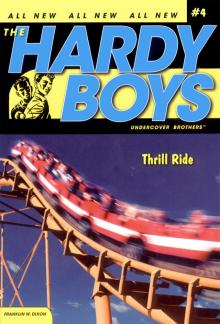 Thrill Ride
Thrill Ride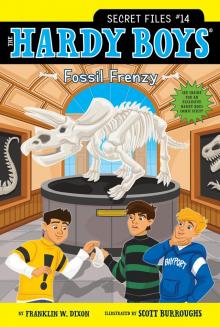 Fossil Frenzy
Fossil Frenzy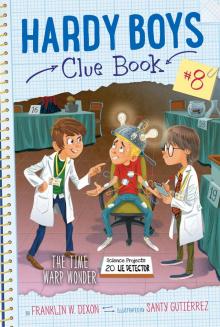 The Time Warp Wonder
The Time Warp Wonder Ghost Stories
Ghost Stories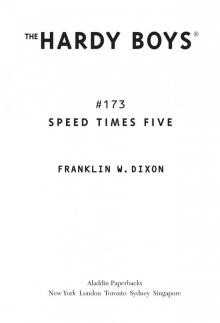 Speed Times Five
Speed Times Five What Happened at Midnight
What Happened at Midnight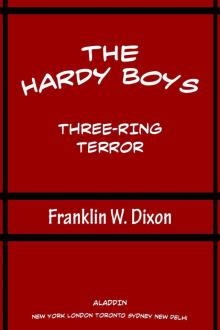 Three-Ring Terror
Three-Ring Terror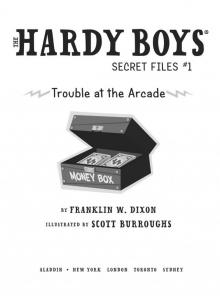 Trouble at the Arcade
Trouble at the Arcade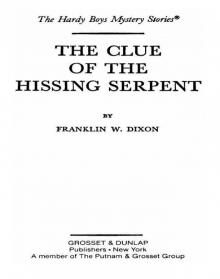 The Clue of the Hissing Serpent
The Clue of the Hissing Serpent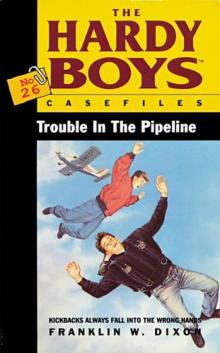 Trouble in the Pipeline
Trouble in the Pipeline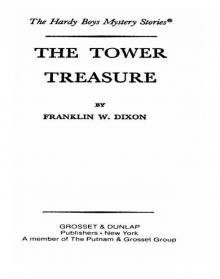 The Tower Treasure
The Tower Treasure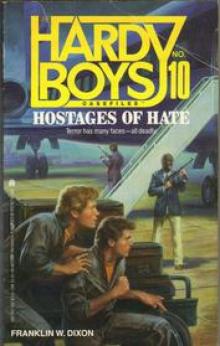 Hostages of Hate
Hostages of Hate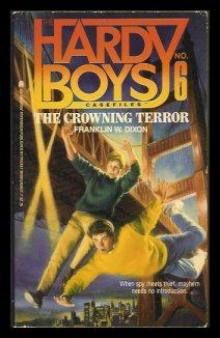 The Crowning Terror
The Crowning Terror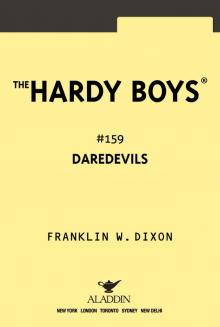 Daredevils
Daredevils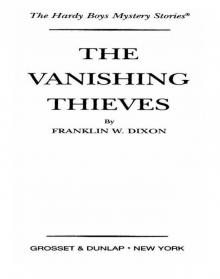 The Vanishing Thieves
The Vanishing Thieves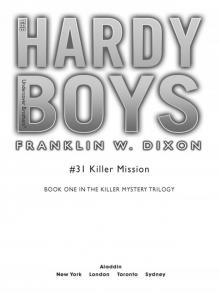 Killer Mission
Killer Mission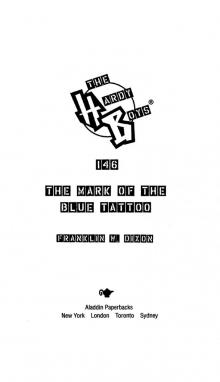 The Mark of the Blue Tattoo
The Mark of the Blue Tattoo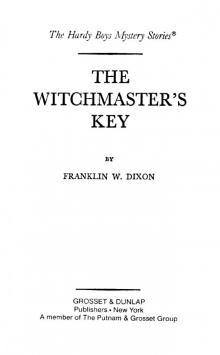 The Witchmaster's Key
The Witchmaster's Key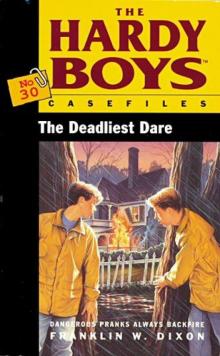 The Deadliest Dare
The Deadliest Dare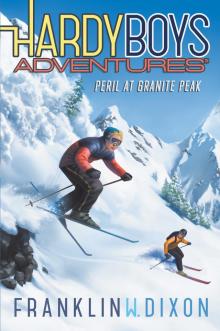 Peril at Granite Peak
Peril at Granite Peak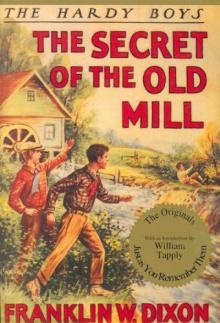 The Secret Of The Old Mill thb-3
The Secret Of The Old Mill thb-3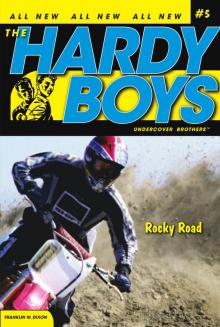 Rocky Road
Rocky Road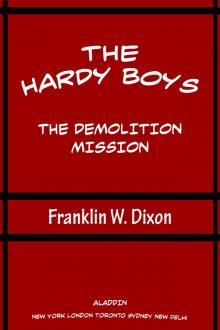 The Demolition Mission
The Demolition Mission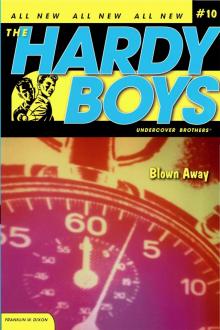 Blown Away
Blown Away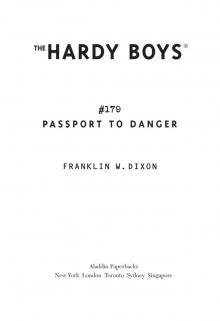 Passport to Danger
Passport to Danger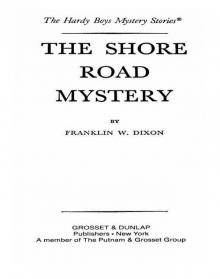 The Shore Road Mystery
The Shore Road Mystery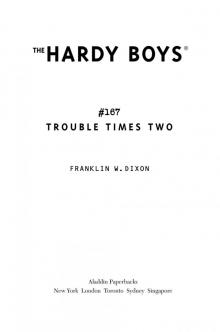 Trouble Times Two
Trouble Times Two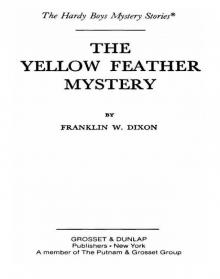 The Yellow Feather Mystery
The Yellow Feather Mystery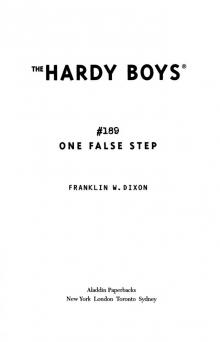 One False Step
One False Step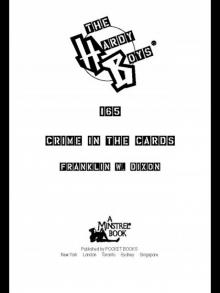 Crime in the Cards
Crime in the Cards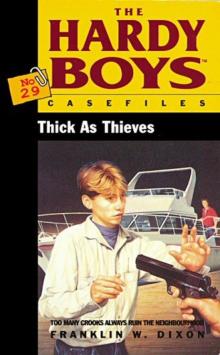 Thick as Thieves
Thick as Thieves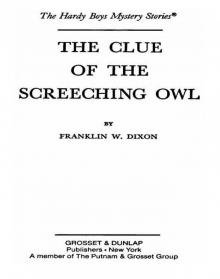 The Clue of the Screeching Owl
The Clue of the Screeching Owl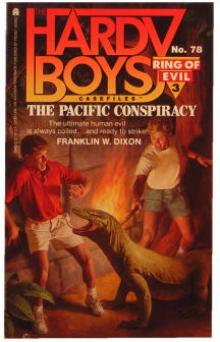 The Pacific Conspiracy
The Pacific Conspiracy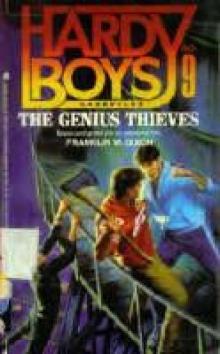 The Genius Thieves
The Genius Thieves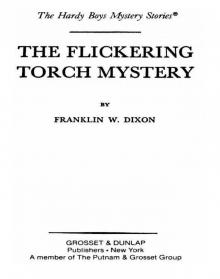 The Flickering Torch Mystery
The Flickering Torch Mystery Into Thin Air
Into Thin Air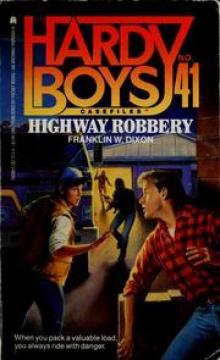 Highway Robbery
Highway Robbery Deadfall
Deadfall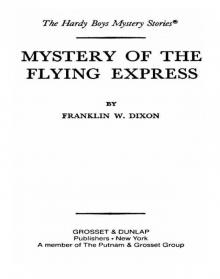 Mystery of the Flying Express
Mystery of the Flying Express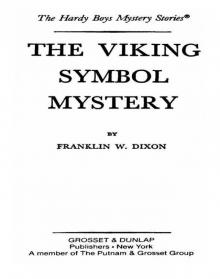 The Viking Symbol Mystery
The Viking Symbol Mystery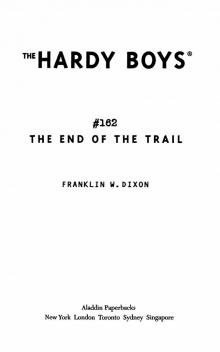 The End of the Trail
The End of the Trail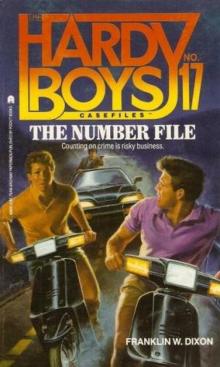 The Number File
The Number File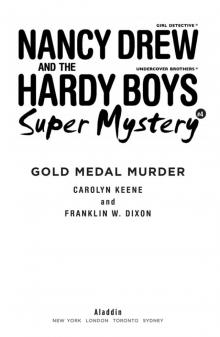 Gold Medal Murder
Gold Medal Murder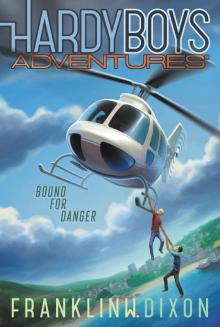 Bound for Danger
Bound for Danger Collision Course
Collision Course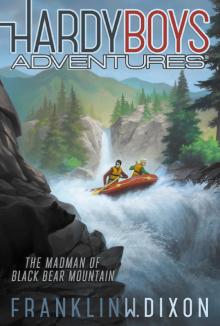 The Madman of Black Bear Mountain
The Madman of Black Bear Mountain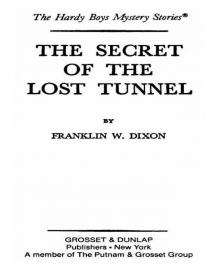 The Secret of the Lost Tunnel
The Secret of the Lost Tunnel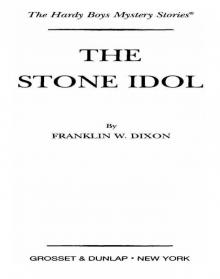 The Stone Idol
The Stone Idol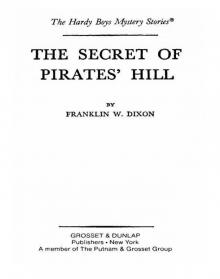 The Secret of Pirates' Hill
The Secret of Pirates' Hill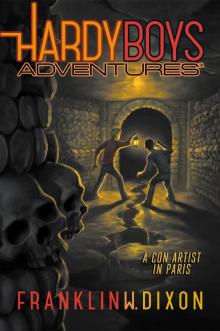 A Con Artist in Paris
A Con Artist in Paris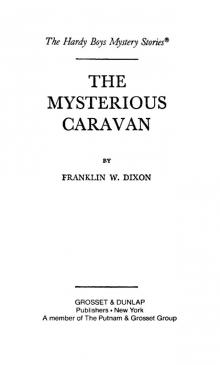 The Mysterious Caravan
The Mysterious Caravan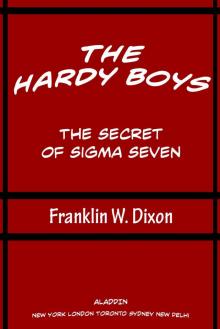 The Secret of Sigma Seven
The Secret of Sigma Seven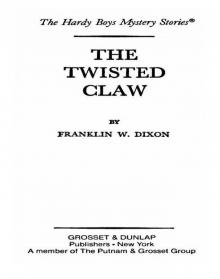 The Twisted Claw
The Twisted Claw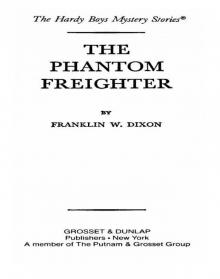 The Phantom Freighter
The Phantom Freighter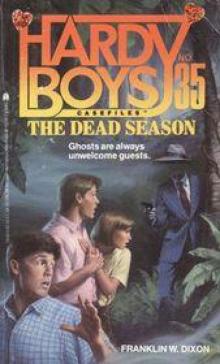 The Dead Season
The Dead Season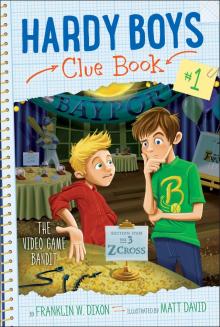 The Video Game Bandit
The Video Game Bandit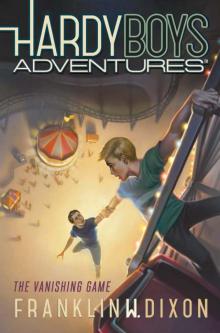 The Vanishing Game
The Vanishing Game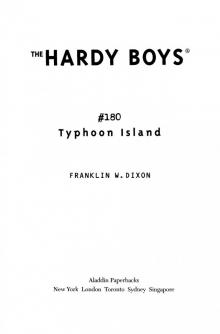 Typhoon Island
Typhoon Island